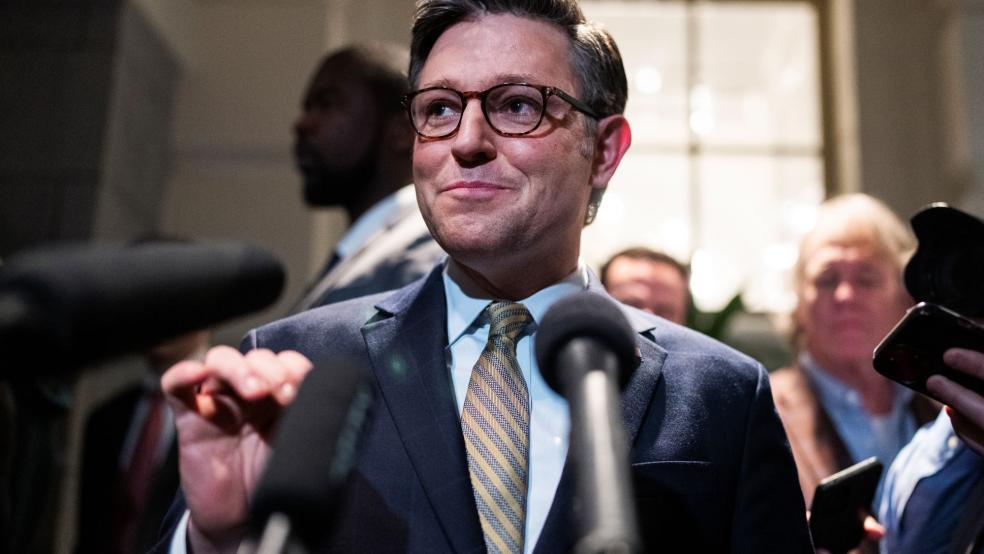With just hours to go before a midnight shutdown deadline, the House on Friday evening overwhelmingly passed a stopgap plan to keep federal agencies open until the middle of March, provide disaster relief for hurricane victims and deliver financial aid to farmers.
The vote was 366-34, with one Democrat voting “present.” More Democrats supported the bill than Republicans, 196 to 170, while all 34 “no” votes came from Republicans.
As has happened before in the 118th Congress, Democrats helped carry fractious Republicans across the finish line. The Senate is expected to pass the legislation late tonight.
The approved plan came together after House Speaker Mike Johnson and his Republican conference again scrambled on Friday to find consensus on a way to keep federal agencies open despite deep divisions within their ranks and pressure from President-elect Donald Trump and his billionaire buddy, Elon Musk.
Trump and Musk had torpedoed a bipartisan Plan A earlier in the week. A slimmed-down Plan B was rejected in a bipartisan vote Thursday night. A potential Plan C — voting on three separate bills to fund the government, provide disaster relief and aid to farmers — faced significant hurdles in the Republican conference.
So House Republicans reportedly opted in a closed-door meeting to pursue Plan D, one vote on one package, under a process that required a two-thirds majority, meaning that Johnson was relying on significant Democratic help.
The package that passed this evening runs 118 pages, similar to the plan that failed yesterday and much shorter than the bipartisan 1,547-page bill that Trump derailed. It would extend federal funding through March 14, extend the current farm bill for a year, provide $100 billion in disaster aid and deliver a reported $30 billion financial assistance for farmers.
Critically, though, the latest plan does not extend or eliminate the debt limit, as Trump had demanded ahead of his return to office. Democrats said that demand was meant to clear a path for a costly round of renewed tax cuts in 2025. In his intraparty discussions, Johnson reportedly promised his conference that Republicans would lift the debt limit by $1.5 trillion as part of their first budget reconciliation bill — and cut $2.5 trillion in mandatory spending. By law, Social Security can’t be touched in a reconciliation bill, but other entitlement programs including Medicare and Medicaid could be.
Jeffries and House Democratic leaders did not whip their members to vote for or against the plan after coming out against Thursday’s bill. The White House announced that President Joe Biden, who has stayed out of the public debate over the stopgap funding plan, supports the latest bill, as it would avoid the disruption and economic pain of a shutdown. The Biden administration on Friday had begun preparations for a shutdown, notifying federal workers that could face furloughs.
“While it does not include everything we sought, it includes disaster relief that the President requested for the communities recovering from the storm, eliminates the accelerated pathway to a tax cut for billionaires, and would ensure that the government can continue to operate at full capacity,” White House Press Secretary Karine Jean-Pierre said in a statement.
Musk, on the other hand, continued to apply pressure, though he also said that Johnson had done “a good job here, given the circumstances” and noted that the latest bill cut much of what was in the bipartisan deal. “It went from a bill that weighed pounds to a bill that weighed ounces,” Musk posted on social media.
Trump earlier had sought to place any blame for a shutdown on Democrats. He posted: “If there is going to be a shutdown of government, let it begin now, under the Biden Administration, not after January 20th, under “TRUMP.” This is a Biden problem to solve, but if Republicans can help solve it, they will!”
Why it matters: The chaotic process delivered a loss for Trump, who inserted himself — and massive amounts of uncertainty — into the debate but saw his main demand rebuffed by fiscal hardliners. Those conservatives may have helped block an increase of the debt limit, but they were not able to block $130 billion in emergency spending without offsets. Even so, the right-wing resistance raises questions about Trump’s sway as he enters a second term, and the frustrations that came to the fore this week leave Johnson under a cloud as he heads for a January 3 vote to pick the speaker.
The bottom line: Congress looks set to avoid a shutdown, and lawmakers will get to head home for the holidays, but nobody really won here. Trump, Johnson, Musk and Republicans all took some lumps, while Democrats watched a bipartisan deal with many of their priorities get blown up.





